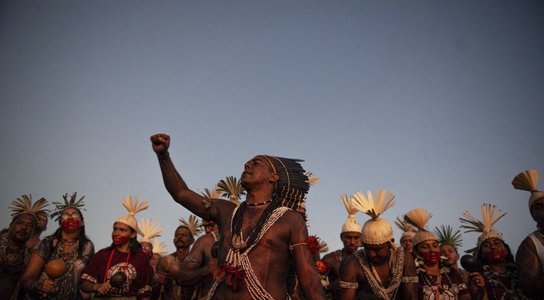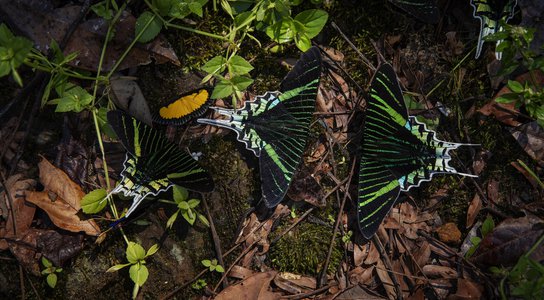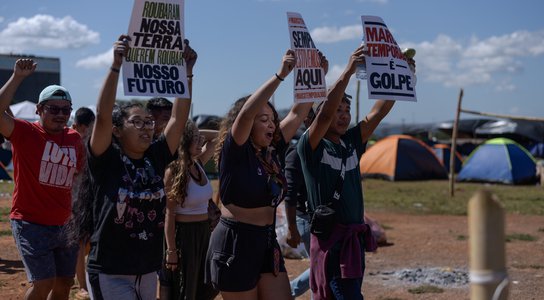In April 2015, Berta Cáceres, an Indigenous campaigner from the highlands of western Honduras, gave an electrifying speech after accepting the Goldman Prize - the world’s most prestigious award for environmental activism.
“Mother Earth – militarised, fenced-in, poisoned, a place where basic rights are systematically violated – demands that we take action,” - Lenca leader Berta Cáceres, in her acceptance speech to a rapt audience in San Francisco.
Her words resonated, and Berta emerged as a global symbol of the struggle to uphold Indigenous rights and shield ecosystems from corporate exploitation.
But less than a year later, on 2 March 2016, gunmen burst into Berta’s home and shot her dead.
This brazen assassination of one of the world’s most high profile Indigenous activists spotlighted the rampant violence and impunity assailing land and environmental defenders in Honduras - described by Global Witness as “the deadliest place to defend the planet”.
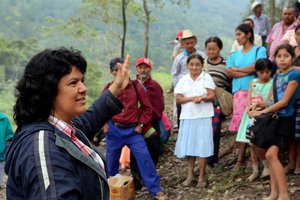
Berta Caceres speaking in Honduras, where she was shot dead on 2 March 2016
A tapestry of dense cloud forest, fertile valleys and tropical coastline, Honduras is rich in biodiversity and natural resources.
Mining, energy, agribusiness and tourism projects - operated for the benefit of a small elite - have been repeatedly approved without adequate assessment or consultation with affected communities.
Honduras is also a key trafficking route for cocaine funnelled north from South America, corroding state institutions and the justice system.
It is no coincidence that Honduras is also among Latin America’s most violent, corrupt and unequal countries.
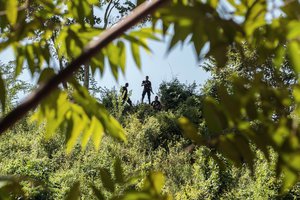
Honduras remains one of the deadliest places to defend the planet
In this perilous context, Berta – together with the organisation she helped found, COPINH – fought alongside Indigenous communities to defend their land and demand their rights, including consultations on projects that could impact them. This struggle put her and other activists in direct conflict with some of the country’s most powerful people.
Before her murder, Berta was supporting the community of Rio Blanco as they opposed plans to construct a hydroelectric dam on the Gualcarque River, a vital water source for the Lenca people.
Owned by a company named DESA (Desarollos Energeticos), and bankrolled by European financial institutions, the dam was one of dozens of hydroelectric and mining projects pushed through without consultation in the wake of a 2009 coup.
In the face of such compromised institutions, the fight for justice after Berta’s murder was long and gruelling.
But in 2018, seven people – a team of four hitmen, two DESA employees, and an army major – were found guilty of her murder.
Four years later, DESA’s President, David Castillo, was also sentenced to 22 years in prison for his role in ordering and planning her killing.
In December 2023, an arrest warrant was issued for the alleged mastermind of the assassination, DESA finance manager Daniel Atala Midence – a member of one of Honduras’s most powerful families. The previous court cases had revealed how Daniel and his uncle, Pedro Atala, had sought to wield their political influence in the wake of the killing. The arrest warrant has not yet been executed, and Atala’s whereabouts are currently unknown.
While the struggle for justice is not yet over, significant progress has been towards it.
But Berta’s case remains the exception in Honduras. Between 2012 and 2022, at least 131 land and environmental defenders were murdered in the country, Global Witness analysis shows. A total of 70 of these murders occurred after Berta was gunned down in 2016.
Land conflict also assails the country’s Afro-descendent Garífuna communities on its Caribbean coast, where at least 16 Afro-descendent defenders have been killed since 2012, often defending their land from corrupt tourist developments and drug traffickers.
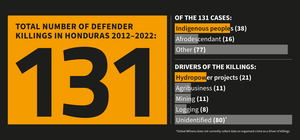
Hope for
change came at the end of 2021, which saw the election
of a reformist President, Xiomara Castro, who vowed to protect
defenders and end open-pit
mining. However,
this hope was short-lived, with rights groups and activists since voicing
disappointment at
Castro’s glaring lack of action, and failure to fulfil her promise to
strengthen human rights and democratic institutions.
These promises are yet to be reflected in improvements on the ground, however, analysis by Global Witness and other rights groups suggests. This is reflected in Global Witness’s data, which found that a further 14 land and environmental defenders were killed in Honduras in 2022. This violence continued into 2023: between January and June, three activists opposing an iron oxidere mine near the village of Guapinol in northern Honduras were shot dead, including a brother and sister.
If Castro and her administration are serious about fulfilling their pledges to protect defenders and uphold Indigenous rights, there are steps they must urgently take.
Firstly, they must ensure that extractive industry concessions that could impact Indigenous and small-scale farming communities proceed only after obtaining their free, prior and informed consent.
They must also vigorously investigate and prosecute threats and attacks against defenders, identifying and charging the intellectual authors. This should include supporting the tri-partite commission, announced last year, to investigate human rights abuses in the Bajo Aguán, where dozens of small-scale farmers have been killed since 2010 in a long-running land conflict with palm oil companies.
Finally, they must ensure defenders are granted effective protective measures via the state human rights protection mechanism - and they must sign and ratify the Escazú Agreement.
Achieving such changes will require further efforts to unpick the deep-rooted corruption and elite capture which continue to corrode Honduras’s state institutions, justice system and security forces. Plans to establish a UN-backed anti-corruption commission offer an excellent opportunity to do just that.
Similarly, the international community must seek alternatives to the militarised approach of the War on Drugs, which has channelled huge wealth and influence into the hands of criminal actors, generating rampant violence and corruption while failing to reduce the flow of narcotics – resulting in what New York prosecutors have termed “state-sponsored drug trafficking”.
Further afield, the involvement of international finance institutions in funding the Agua Zarca dam demonstrates the need for tighter laws to ensure that financial institutions carry out thorough checks on human rights and environmental risks throughout their global value chains.
Specifically, it clearly demonstrates why EU countries must reverse a decision made in December 2022 to let the financial sector off the hook from new mandatory environmental and human rights due diligence obligations.
As Berta’s daughter argued in a letter to EU Commissioners that such rules could have prevented the Agua Zarca project and the violence it generated from ever taking place.
Only through such fundamental reforms can Honduras end impunity, tackle corruption, and move towards the society that Berta - and hundreds of other land and environmental defenders – died fighting for.
